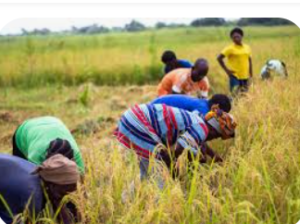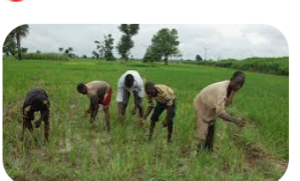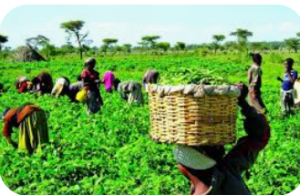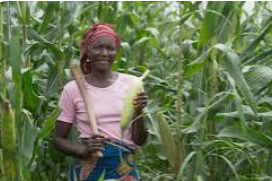How Investing in Agriculture Can Rescue Nigeria from Economic Hardship
How Investing in Agriculture Can Rescue Nigeria from Economic Hardship
By Tope John Fakinlede

Tope John Fakinlede
Nigeria is currently grappling with severe economic challenges. Recent fuel price increases, driven by the government’s removal of fuel subsidies, have led to skyrocketing costs for goods and services, placing a heavy burden on many Nigerians. While the government has provided palliatives and grants as a temporary fix, these measures often fail to reach the most needy and are sometimes misappropriated, ending up with those who are already well-off. To effectively address these issues and provide sustainable relief, Nigeria must focus on a strategic investment in agriculture.

Solutions :
1. Support for Farmers: The government should provide comprehensive support to farmers to boost local food production. This includes subsidizing the cost of essential agricultural inputs such as fertilizers, chemicals, farm tools like cutlasses and hoes, and investing in key equipment such as tractors and plows. Providing free fertilizers, sprayers, seeds, and loans to genuine farmers will enhance agricultural productivity and stabilize food prices.

2. Education and Training: To attract youth into farming, the government should prioritize agricultural education and conduct seminars that showcase the benefits and opportunities within the sector. By making farming a more appealing career choice, we can cultivate a new generation of skilled farmers and ensure a sustainable agricultural future.

3. Government-Funded Farms: Establishing federal and state government farms across all states is crucial. These farms can serve as practical training grounds for new farmers and ensure a steady supply of food. Demonstrating effective agricultural practices through these farms will provide valuable experience and support local food security.

4. Investment in Livestock: Investing in livestock farming is essential for reducing reliance on imports and meeting local demand. This diversification can also create additional job opportunities and contribute to overall economic stability.
5. Reevaluating Palliatives: The current palliatives, while well-intentioned, often fail to reach those who need them most and can be misappropriated. The government should either ensure that these aid measures effectively reach the poor and vulnerable or reconsider their approach to providing assistance.
By redirecting focus and resources towards agriculture and creating government-run farms in every state, Nigeria can better tackle the economic challenges posed by rising fuel costs. This approach will not only address immediate hardships but also lay the foundation for long-term economic stability and growth. Investing in agriculture offers a viable path to self-sufficiency and prosperity, benefiting the entire nation.
TRENDING SONGS
 Shock in Anambra: Bride Disappears Moments Before Wedding
Shock in Anambra: Bride Disappears Moments Before Wedding
 Nigerian Woman Returns ₦330 Million Accidentally Credited to Her Account
Nigerian Woman Returns ₦330 Million Accidentally Credited to Her Account
 APC Don Reach Morocco?’ VeryDarkMan Reacts to Seyi Tinubu Poster
APC Don Reach Morocco?’ VeryDarkMan Reacts to Seyi Tinubu Poster
 Bride Breaks Down in Tears as Wedding Meals Were Kept Secretly While Guests Go Home Hungry
Bride Breaks Down in Tears as Wedding Meals Were Kept Secretly While Guests Go Home Hungry
 Odogwu by Day, Robber by Night: How Marriage Joy Turned Into Tragedy
Odogwu by Day, Robber by Night: How Marriage Joy Turned Into Tragedy
 Nigerian Officials Allegedly Pocket N4–6B Weekly Through Smuggling Cartels at Seme–Badagry Border
Nigerian Officials Allegedly Pocket N4–6B Weekly Through Smuggling Cartels at Seme–Badagry Border
 Ahmad Yerima: Naval Officer to Face No Sanctions After Clash with Wike – Matawalle
Ahmad Yerima: Naval Officer to Face No Sanctions After Clash with Wike – Matawalle
 Trending Video: Muslim Man Joins Wife in Hallelujah Challenge ‘Dress Like Your Miracle’ Night
Trending Video: Muslim Man Joins Wife in Hallelujah Challenge ‘Dress Like Your Miracle’ Night
 Woman Seeks Advice as Late Brother’s Wife Refuses to Mourn Him Following His Death With Alleged Mistress
Woman Seeks Advice as Late Brother’s Wife Refuses to Mourn Him Following His Death With Alleged Mistress
 Nobody Cares About Fine Girls In The UK, I Miss Nigeria — Nigerian Lady Laments
Nobody Cares About Fine Girls In The UK, I Miss Nigeria — Nigerian Lady Laments
Share this post with your friends on ![]()













